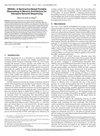针对I/O密集型工作负载的泄漏感知直接I/O
IF 1.4
3区 计算机科学
Q4 COMPUTER SCIENCE, HARDWARE & ARCHITECTURE
引用次数: 0
摘要
随着I/O技术的进步,对高性能的I/O数据处理提出了前所未有的要求,导致了DDIO (data Direct I/O)技术的发展。DDIO通过与任何类型的I/O设备合作,直接将所有入站I/O数据注入最后一级缓存(LLC),从而提高了I/O处理效率。尽管如此,在某些具有多个I/O应用程序的场景中,由于LLC内部的干扰,DDIO的性能可能不太理想,从而导致系统性能下降。特别是,在本文中,我们证明了现代高性能NVMe ssd上的存储I/O很难从DDIO中受益,有时由于“泄漏DMA问题”导致共享LLC的低效使用。为了解决这个问题,我们提出了LADIO,这是一种自适应方法,通过动态控制DDIO功能和根据存储I/O数据的泄漏和局域性重新分配LLC方式来减轻应用程序间的干扰。在有严重I/O干扰的场景中,radio在保持存储密集型应用的吞吐量的同时,将网络密集型应用的吞吐量提高20%。本文章由计算机程序翻译,如有差异,请以英文原文为准。
LADIO: Leakage-Aware Direct I/O for I/O-Intensive Workloads
The advancement in I/O technology has posed an unprecedented demand for high-performance processing on I/O data, leading to the development of Data Direct I/O (DDIO) technology. DDIO improves I/O processing efficiency by directly injecting all inbound I/O data into the last-level cache (LLC) in cooperation with any type of I/O device. Nonetheless, in certain scenarios with more than one I/O applications, DDIO may have sub-optimal performance caused by interference inside the LLC, resulting in the degradation of system performance. Especially, in this paper, we demonstrate that storage I/O on modern high-performance NVMe SSDs hardly benefits from DDIO, sometimes causing inefficient use of the shared LLC due to the “leaky DMA problem”. To address this problem, we propose
LADIO
, an adaptive approach that mitigates inter-application interference by dynamically controlling the DDIO functionality and reallocating LLC ways based on the leakage and locality of storage I/O data, respectively. In scenarios with heavy I/O interference,
LADIO
improves the throughput of network-intensive applications by 20% while maintaining that of storage-intensive applications.
求助全文
通过发布文献求助,成功后即可免费获取论文全文。
去求助
来源期刊

IEEE Computer Architecture Letters
COMPUTER SCIENCE, HARDWARE & ARCHITECTURE-
CiteScore
4.60
自引率
4.30%
发文量
29
期刊介绍:
IEEE Computer Architecture Letters is a rigorously peer-reviewed forum for publishing early, high-impact results in the areas of uni- and multiprocessor computer systems, computer architecture, microarchitecture, workload characterization, performance evaluation and simulation techniques, and power-aware computing. Submissions are welcomed on any topic in computer architecture, especially but not limited to: microprocessor and multiprocessor systems, microarchitecture and ILP processors, workload characterization, performance evaluation and simulation techniques, compiler-hardware and operating system-hardware interactions, interconnect architectures, memory and cache systems, power and thermal issues at the architecture level, I/O architectures and techniques, independent validation of previously published results, analysis of unsuccessful techniques, domain-specific processor architectures (e.g., embedded, graphics, network, etc.), real-time and high-availability architectures, reconfigurable systems.
 求助内容:
求助内容: 应助结果提醒方式:
应助结果提醒方式:


